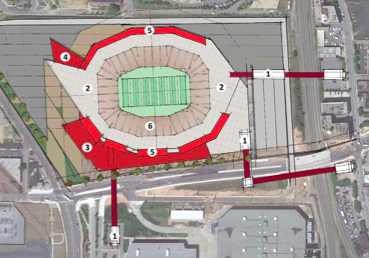
Watchdog group Common Cause Georgia is calling on the Atlanta City Council to hold a public referendum and allow the citizens of the City of Atlanta to vote on the public funding of the proposed billion dollar stadium for the Atlanta Falcons.
CCGA was joined by State Senator Vincent Fort (D-Atlanta) and others who believe the public should be included in the public funding decision.
Atlanta’s mayor and Falcons owner Arthur Blank announced that they had agreed to financing terms for a new $1 billion, retractable-roof stadium to replace the 20-year-old Georgia Dome and keep the team’s home games in the city’s downtown last Thursday.
But CCGA says no way. They are fully opposed to public funding of the project and have told the Falcons to put the brakes on it and get the public more involved in what’s going on.
Speaking during a news conference on the steps of City Hall, Fort called for a referendum saying there are “a number of questions surrounding the cost of infrastructure and other issues that only public debate surrounding a referendum can address.”
Common Cause believes that more public input is needed and claims that everything has been done behind closed doors.
“You’re left very clearly with the negotiating parties excluding the public while including the public’s money,” Common Cause board member Wyc Orr has said in earlier statements.
Mayor Kasim Reed said the city would provide $200 million of construction costs through bonds backed by the city’s hotel-motel tax. The Falcons franchise, owned by Home Depot co-founder Arthur Blank, would provide $800 million and be responsible for construction cost overruns.
The Falcons would pay for up to $50 million in infrastructure costs not included in the construction budget and help retire the last few years of debt on the Georgia Dome, which was publicly financed entirely using the hotel-motel tax.
Also, Blank’s private foundation and the city each would spend $15 million on surrounding neighborhood development.
Blank — who has built his football franchise into a perennial playoff contender — still must negotiate a detailed lease and operating agreement with the Georgia World Congress Center. That’s the state agency that owns the existing dome and would own the replacement. Reed also must get the blessing of the Atlanta City Council, though several members attended the announcement in the mayor’s office, as did Georgia Gov. Nathan Deal.
Officials said the deal presumes the stadium would be built immediately south of the existing Georgia Dome, though that is contingent on securing adjacent property that is not yet publicly owned. A secondary site is available several blocks north of the current stadium.
The Georgia Dome would be demolished after the new stadium opens.
Last week’s announcement, which took on a celebratory tone at City Hall, comes after months of private negotiations _ and several years of planning and studies _ involving the governor’s office, the World Congress Center Authority and the mayor’s office, among others.
Reed called the arrangement ”a great public-private partnership” that will benefit the city and the state.
City Council President Ceasar C. Mitchell said he was encouraged by the mayor’s announcement, and he promised public hearings in the near future.
Deal praised the agreement, as well. At one time, the governor was the focal point of negotiations, when Blank sought $300 million in state debt to $700 million from him. Deal never publicly endorsed or rejected that split, but it became clear that the General Assembly was unwilling to raise the state’s debt limit to accommodate the bond sale.
So now the city is left to sell the bonds using the tourism tax _ a move authorized by the legislature _ to pay back investors.
Blank called it ”a win-win” and promised that the new stadium will help the city continue to compete for all major events, including the Super Bowl. ”That’s the only secret ballot in the NFL,” he said. ”We’ll have to earn it. But this public support is an important piece.”
Though the terms of an operating agreement are not final, Blank told The Associated Press that he doesn’t expect fundamental changes to an outline released late last year.
That document from the World Congress Center and the team said the Falcons would lease the stadium for 30 years, paying the state $2.5 million annually in rent.
